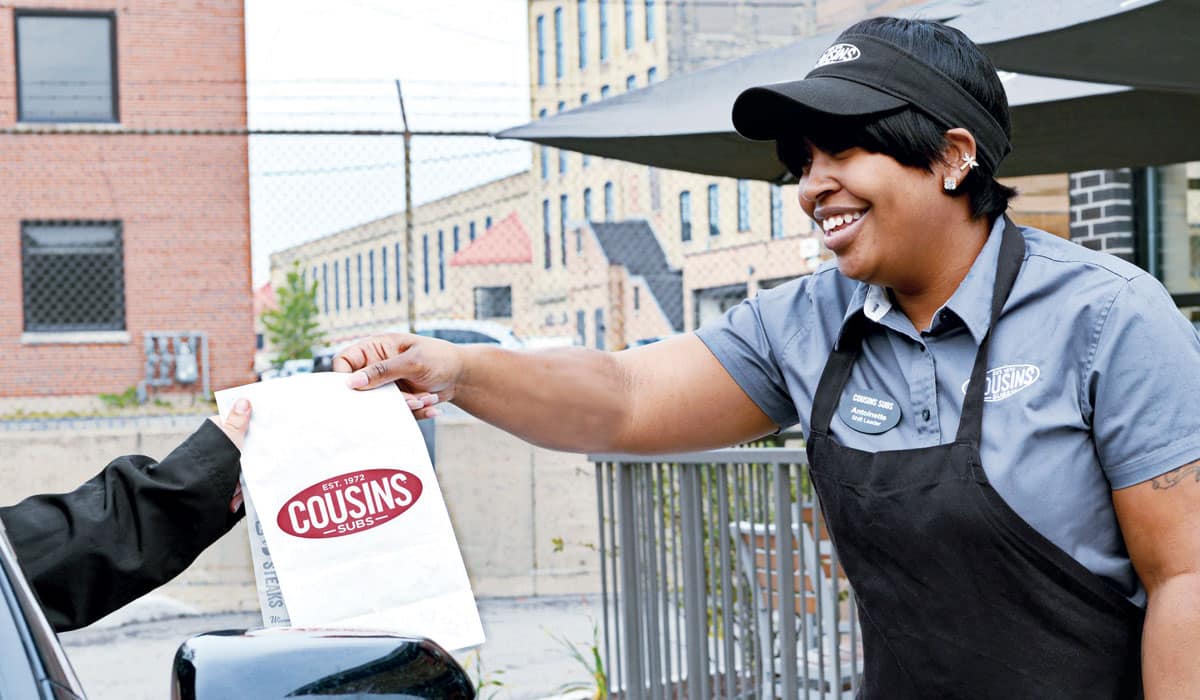It’s safe to say that this spring was the worst period American restaurants have ever faced. The coronavirus pandemic was the type of scenario no one could have envisioned, unfolding one nightmarish day at a time. The crisis also exposed which franchises had an efficient line of communication throughout their brands to, at the very least, help themselves and their franchisees weather the storm.
“When the numbers reach a 30 percent sales drop, you really can’t prepare for that,” says Christine Specht, CEO of Wisconsin-based Cousins Subs. “But in a way, you probably at least have a sense of who is going to handle the challenge well. Who likes process? Who likes clear communication? This experience has really helped us see the strengths in our leadership team that we already knew they possessed, but now they were on fire with it.”
As government-issued lockdowns were handed down in March and April, brand leaders rushed to push out clear directives. Franchisees looked to franchisors to help drive messaging to a public who had no way of knowing which restaurants were open, or which channels of business they were willing, or allowed, to patronize.
One of the ways Cousins Subs navigated the crisis and helped franchisees manage their relationship with customers was leaning into their loyalty program. They offered digital, $5-off coupons for new loyalty members in March, aiming to gain customers’ email addresses and establish a line of communication.
“We wanted customers to feel connected to our brand in a more significant way, whether it’s new product offerings or changes that we’re making during this time,” Specht says. “What we’re trying to do is communicate clearly and effectively. There’s so much information coming at people that we know some people are going to check out. We want to make sure our emails aren’t going to get missed.”
An especially challenging dilemma for many brands was navigating the unique circumstances across locations. A case-by-case evaluation of how to manage messaging to both customers and franchisees was required to make sure no falsehoods were spread and all government-issued directives were followed.
Firehouse Subs CEO Don Fox was faced with that exact challenge as the 1,200-unit brand grappled with the early days of the pandemic. Fox, who has been in the industry since the 1980s, has helped both Burger King and Firehouse Subs (which he joined in 2003) navigate economic downturns like the one that followed 9/11 and the Great Recession. But the coronavirus was a new challenge, both in scale and scope.
In mid-March, as more information was shared about the virus and a growing number of municipalities announced restrictions on restaurants, Fox had all locations close their dining rooms to the public just an hour before they were scheduled to open on a Monday. While the move wasn’t required by law at all locations, Fox felt it was the best way to keep employees and customers safe.
“Like most things we’ve ended up doing, we had to close our dining rooms on very short notice,” Fox says. “I knew it wasn’t going to be popular in some corners, but we have a great communication network and I think that’s very important for any system. And any brand that had weaknesses coming into this crisis? Well, they’re probably being exposed.”
The brand went from one quarterly meeting with its marketing board, made up of franchisees, to one meeting per week. Those gatherings have been helpful, says Larry Chandler, a franchisee who owns more than 30 Firehouse Subs units.
“It gives us a chance to have regular updates on what [Fox] is thinking, and what the task force is coming up with to help us get through this,” Chandler says. “It also gives us a chance to ask questions, and after that, we are able to pass along information to all of the other franchisees and make sure everyone is on the same page.”
The frequency of meetings meant that some decisions were made with input from the franchisee community. On the other hand, some decisions—like closing the dining rooms so abruptly—required swift-acting leadership.
“Because of the rapidity with which we’ve had to act at times, if we’re going to be effective in the marketplace, and keep our workers safe, sometimes the franchisees just had to trust us to lead,” Fox says. “It puts the onus on me and my team to be right when we do act, and in my opinion, you have to have earned that trust from the franchisees prior to something like the COVID-19 pandemic happening.”
Other steps taken by brands back in March included notifying franchisees that royalty payments would be put on hold, canceled, or cut back. Again, clear communication was pivotal.
“The most important thing is not to be a silent leader,” says Carl Howard, CEO of Fazoli’s, the 200-plus unit Italian brand based in Louisville, Kentucky. “We’ve had many discussions with our franchisees and we are communicating to them directly and often. For example, we sent out a memo re-highlighting all of the cost savings measures we made internally and asked our franchisees to please implement what makes sense for their own business.”
For Fazoli’s, those cost-saving measures included reducing hood cleanings or moving them back, and going to one trash pick-up a week versus two or three.
The C-suite helped handle other bottom-line costs, like dealing with landlords on if and when rent was due. The brand also cut back the percentage franchisees needed to contribute for advertising dollars.
“We basically said, ‘This will calm down at some point,’” Howard says. “Eventually, people will go back to their normal routine. Until that time, we just need to communicate really clearly to our guests and employees, and be very cautious, but direct.”

